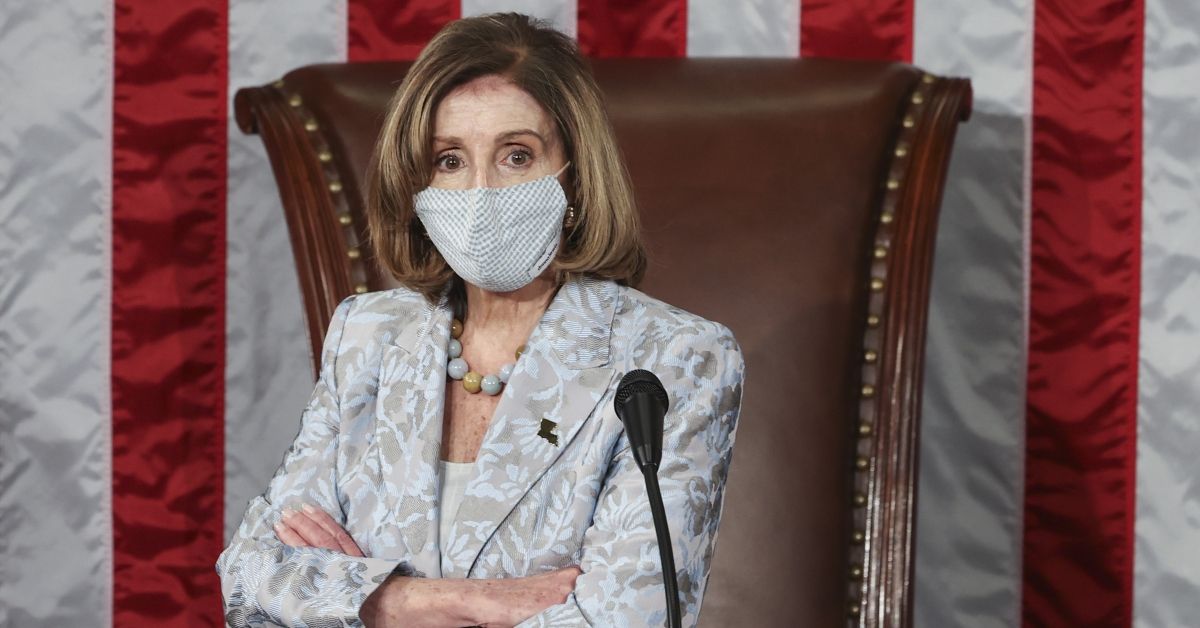Pelosi and other Democrats proposed replacing gender-specific terms with gender-neutral alternatives in the text of a document called the "Rules of the House of Representatives."
The proposal was limited to a single document, and would not prevent House members from using gender-specific language in making speeches, drafting bills, or otherwise conducting House business.
In January 2021, readers asked Snopes to examine claims that U.S. House Speaker Nancy Pelosi had orchestrated a move to remove gender-specific terms like "mother" and "father" from use in the U.S. House of Representatives.
On Twitter, the controversial right-wing commentator Dinesh D'Souza said that, under the proposals:
"Suddenly you're not allowed, in House communications, to refer to fathers or mothers or grandfathers or grandmothers or brothers or sisters, or even stepsons or stepdaughters or father-in-laws [sic] or mother-in-laws [sic]. The whole gendered vocabulary is essentially abolished."
On Jan. 3, the former NFL player and conservative commentator Judd Garrett published a blog post in which he wrote that:
"On Friday, Speaker of the House, Nancy Pelosi, unveiled new rules for her chamber which removed gendered terms, such as 'father, mother, son, daughter, brother, sister, uncle, aunt' and replaced them with terms such as 'parent, child, sibling, parent’s sibling.'"
That missive was later re-published by the conservative commentator Rip McIntosh, and shared widely on Facebook.
On Jan. 1, the website of controversial former Fox radio host Todd Starnes published an article with the headline "Pelosi Introduces House Rules That Eliminate Words Like “Mother, Father, Son and Daughter,” and Breitbart published an account with the headline "Nancy Pelosi Bans 'Gender' Terms Like Mother, Daughter, Father, Son in House Rules."
The way in which the accounts highlighted above phrased their descriptions of the proposed changes gave the mistaken impression that the new rules proposed by Pelosi and others would "ban," "eliminate," or "remove" gender-specific words from usage in the House of Representatives.
In fact, Democrats had moved to replace gender-specific language with gender-neutral language only in the text of the rules of the House. The proposal was limited to that single document and would not impinge upon the freedom of any House members to use gender-specific language in the course of conducting the business of the House.
D'Souza's explicit claim that the the proposals would "abolish" "gendered vocabulary" from "House communications" was false.
Analysis
The way that the House of Representatives conducts business is governed in part by a set of rules, contained in a document entitled "Rules of the House of Representatives." Each incoming Congress adapts a new set of rules.
On Jan. 1, Pelosi and House Rules Committee Chairman James McGovern announced House Resolution 8, a set of measures intended to re-adopt the existing rules for the incoming 117th Congress, with some significant amendments. Those would-be changes included:
- Establishing an Office of Diversity and Inclusion
- Establishing an Office of the Whistleblower Ombuds
- Barring former House members from entering the House if they have been convicted of a crime connected to their election to, or service in, the House
- Directing the Ethics Committee to advise on possible disciplinary measures for House members or staff who share manipulated videos and photographs online
- Replacing certain gender-specific terms, in the text of the rules, with gender-neutral alternatives, including;
- "Seafarers" for "seamen"
- "Chair" for "Chairman"
- "Parent, child, sibling, parent’s sibling, first cousin, sibling’s child, spouse, parent in-law, child-in-law, sibling-in-law, stepparent, stepchild, stepsibling, half-sibling, or grandchild’’ for "‘father, mother, son, daughter, brother, sister, uncle, aunt, first cousin, nephew, niece, husband, wife, father-in-law, mother-in-law, son-in-law, daughter-in-law, brother-in-law, sister-in-law, stepfather, stepmother, stepson, stepdaughter, stepbrother, stepsister, half brother, half sister, grandson, or granddaughter," respectively
- "Resign" for "submit his or her resignation"
- "Such Member, Delegate, or Resident Commissioner serves" for "he or she serves"
- "Such Member, Delegate, or Resident Commissioner holds" for "he or she holds"
- "Themself" for "himself or herself"
The introduction of gender-neutral language proposed by McGovern and Pelosi would only change the text of the House rules. Its consequences were limited to that document alone, and would have no bearing on the continued ability of House members to use gender-specific language in drafting legislation and resolutions, making speeches, or conducting a debate.
Therefore, D'Souza's claim that the proposed changes would "abolish" gender-specific language from "House communications" was false, and the ambiguous way in which several observers described the proposals created the same mistaken impression.

